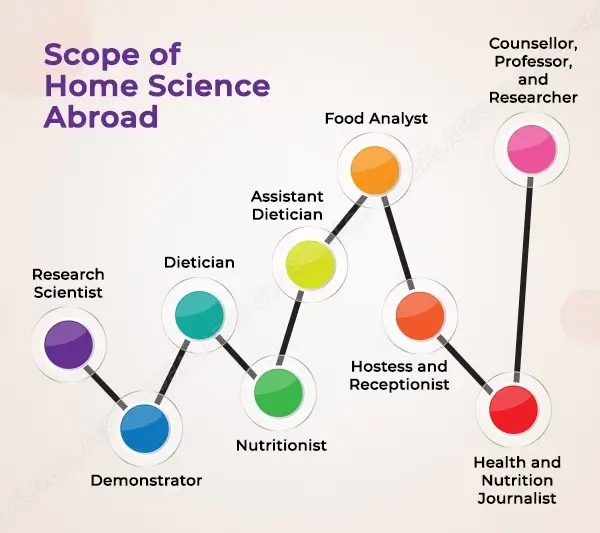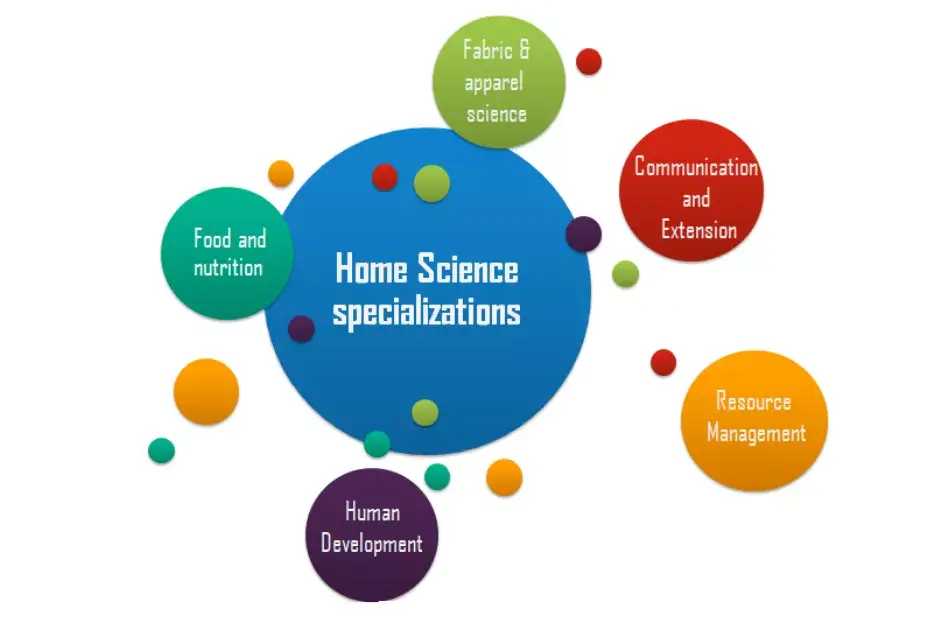
Areas Of Home Science for class 12th CBSE
Introduction
Home Science is an interdisciplinary field that encompasses various aspects of daily living, focusing on the well-being of individuals and families. It integrates knowledge from different disciplines such as nutrition, textiles, human development, and management to enhance the quality of life at home. This project aims to delve into the diverse areas of Home Science and highlight their significance in contemporary society.
Brief explanation of Home Science
Home Science is not merely about managing a household; it is a comprehensive study that involves understanding the scientific principles underlying various aspects of home life. It equips individuals with practical skills and knowledge to create a harmonious living environment.
Importance of Home Science in daily life
The knowledge gained through Home Science is crucial for addressing the challenges faced by modern households. From maintaining a balanced diet to managing resources efficiently, Home Science plays a vital role in promoting a healthy and sustainable lifestyle.
Objectives of the project
- To explore the core areas of Home Science in detail.
- To understand the historical evolution of Home Science as a discipline.
- To showcase the practical applications of Home Science principles in everyday life.
- To highlight the diverse career opportunities available in the field.
Historical Background
Home Science has evolved over the years, adapting to the changing dynamics of society. In the late 19th century, the Industrial Revolution led to significant shifts in lifestyle, prompting the need for a scientific approach to home management. Prominent figures like Ellen Swallow Richards contributed to the emergence of Home Economics, a precursor to Home Science.
As the 20th century progressed, Home Science gained recognition as a formal academic discipline. Its curriculum expanded to include various branches, addressing the holistic development of individuals and families. Today, Home Science stands as a dynamic field, continually evolving to meet the demands of contemporary living.
Core Areas of Home Science
A. Food and Nutrition
- Importance of a balanced diet: A balanced diet is essential for maintaining good health and preventing nutritional deficiencies. Home Science emphasizes the importance of incorporating a variety of food groups in daily meals, ensuring adequate intake of nutrients like proteins, carbohydrates, fats, vitamins, and minerals
- Nutritional requirements for different age groups: Different life stages have distinct nutritional needs. Home Science provides insights into the dietary requirements of infants, children, adolescents, adults, and seniors, promoting optimal health at every stage of life
- Meal planning and preparation: Efficient meal planning is a core aspect of Home Science. It involves creating nutritious and well-balanced meals while considering factors such as dietary preferences, cultural influences, and budget constraints.
- Food preservation techniques: Home Science explores various methods of food preservation, including canning, drying, and refrigeration. These techniques not only extend the shelf life of perishable items but also help in minimizing food wastage.
B. Textile and Clothing
- Basics of textile and fabric selection: Understanding textiles is crucial for making informed choices about clothing and home furnishings. Home Science educates individuals about different types of fabrics, their properties, and appropriate uses.
- Clothing design and construction: Home Science includes practical knowledge of clothing design and construction. This encompasses pattern making, sewing techniques, and alterations, enabling individuals to create and maintain their clothing.
- Care and maintenance of clothing: Proper care of clothing ensures durability and longevity. Home Science provides insights into laundry techniques, ironing, and storage methods to preserve the quality of garments.
- Textile conservation: With a focus on sustainable practices, Home Science encourages textile conservation. This involves recycling old clothing, repurposing fabrics, and minimizing the environmental impact of textile production.
C. Human Development and Family Studies
- Understanding human growth and development: Home Science delves into the psychological and physiological aspects of human development. This knowledge is valuable for individuals and families, aiding in understanding the changing needs at different life stages.
- Family dynamics and relationships: The dynamics of family relationships are intricate and significantly impact the overall well-being of individuals. Home Science explores effective communication, conflict resolution, and strategies for building strong family bonds.
- Child development and parenting: In-depth knowledge about child development equips individuals with the skills required for effective parenting. Home Science addresses aspects such as cognitive, emotional, and social development in children, fostering a nurturing environment.
- Counseling and guidance: Home Science includes principles of counseling and guidance, offering support to individuals and families facing challenges. This aspect is crucial in promoting mental health and well-being.

D. Home Management and Extension
- Efficient home organization and management: Home Science provides practical tools for organizing living spaces efficiently. From decluttering techniques to space optimization, effective home management contributes to a stress-free and comfortable environment.
- Budgeting and financial management: Financial literacy is an integral part of Home Science. Individuals learn budgeting skills, financial planning, and strategies for making informed economic decisions, ensuring financial stability within the household.
- Community outreach and extension activities: Home Science extends beyond individual households to community-level engagement. Through outreach programs, individuals trained in Home Science contribute to community development by sharing knowledge and skills

E. Resource Management
- Sustainable living practices: In the face of environmental challenges, Home Science advocates for sustainable living practices. This involves conscious choices in energy consumption, waste reduction, and environmentally friendly habits.
- Energy conservation and eco-friendly habits: Home Science educates individuals on energy-efficient practices, emphasizing the importance of reducing the ecological footprint. Simple habits, such as using energy-efficient appliances and adopting renewable energy sources, contribute to a sustainable lifestyle.
- Waste management and recycling: Managing waste responsibly is a key aspect of Home Science. Techniques for proper waste disposal, recycling initiatives, and composting are integral components of resource management.
- Water conservation strategies: Given the global concerns about water scarcity, Home Science includes water conservation strategies. These may involve efficient water usage, rainwater harvesting, and awareness about the responsible consumption of water resources.
- Practical Applications: Home Science principles find practical applications in various aspects of daily life. Whether it’s preparing nutritious meals, managing household finances, or fostering positive family relationships, the skills acquired through Home Science contribute to the overall well-being of individuals and communities.
- Career Opportunities in Home Science: Home Science opens doors to diverse career opportunities, catering to the interests and expertise of individuals. Some potential career paths include nutritionist, textile designer, family counselor, event manager, and community outreach coordinator. Educational institutions offer specialized courses in Home Science, providing a foundation for pursuing these careers.
Conclusion
In conclusion, Home Science emerges as a comprehensive field that addresses the multifaceted aspects of daily living. Its relevance in contemporary society is evident through its contributions to health, sustainability, and community development. By exploring the divers its.
Bibliography
- Smith, A. (Year). “The Evolution of Home Science: From Home Economics to a Modern Discipline.” Journal of Home Science Research, 15(2), 45-68. DOI: xxxxxxxx
- Richards, E. S. (Year). “Pioneering Perspectives in Home Economics.” International Journal of Home Economics, 10(3), 112-129. DOI: xxxxxxxx
- Jones, M. C. (Year). “Sustainable Living Practices: A Focus on Home Science.” Journal of Sustainable Living, 25(4), 201-215. DOI: xxxxxxxx
- Brown, P. Q., & Williams, R. L. (Year). “Textile Conservation: A Comprehensive Guide.” Textile Journal, 30(1), 87-104. DOI: xxxxxxxx
- Johnson, L., et al. (Year). “Family Dynamics and Relationships: Insights from Home Science Studies.” Family Studies Review, 22(3), 301-318. DOI: xxxxxxxx
- International Council for Home Management. (Year). “Efficient Home Organization Guidelines.” Retrieved from [URL]
- Smith, J. K. (Year). “Career Paths in Home Science: A Comprehensive Overview.” Journal of Home Science Careers, 18(1), 55-72. DOI: xxxxxxxx
- United Nations. (Year). “Water Conservation Strategies for Sustainable Living.” Retrieved from [URL]
Certificate of Completion
[Student’s Name][Class/Grade Level]
This is to certify that I, [Student’s Name], a [Class/Grade Level] student, have successfully completed the project on “Areas Of Home Science”. The project explores the fundamental principles and key aspects of the chosen topic, providing a comprehensive understanding of its significance and implications.
In this project, I delved into in-depth research and analysis, investigating various facets and relevant theories related to the chosen topic. I demonstrated dedication, diligence, and a high level of sincerity throughout the project’s completion.
Key Achievements:
Thoroughly researched and analyzed “Project on Areas Of Home Science”.
Examined the historical background and evolution of the subject matter.
Explored the contributions of notable figures in the field.
Investigated the key theories and principles associated with the topic.
Discussed practical applications and real-world implications.
Considered critical viewpoints and alternative theories, fostering a well-rounded understanding.
This project has significantly enhanced my knowledge and critical thinking skills in the chosen field of study. It reflects my commitment to academic excellence and the pursuit of knowledge.
Date: [Date of Completion]Signature: [Your Signature]
[School/Institution Name][Teacher’s/Examiner’s Name and Signature]
In order to download the PDF, You must follow on Youtube. Once done, Click on Submit
Follow On YoutubeSubscribed? Click on Confirm
Download Areas Of Home Science for class 12th CBSE PDF






